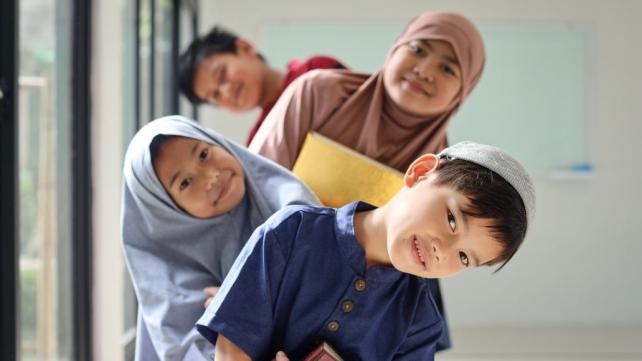
The Arabic word for smile “bassama” appears in the Holy Quran at Surah An Naml ayah 19 when Prophet Sulaiman (AS) reacts to a warning the ants give each other to seek shelter so as not to be inadvertently crushed from Sulaiman (AS) and his armies.
So he smiled in amusement at her words, and prayed, “My Lord! Inspire me to ˹always˺ be thankful for Your favours which You have blessed me and my parents with, and to do good deeds that please you. Admit me, by Your mercy, into ˹the company of˺ Your righteous servants.”
There is much wisdom in the symbolism and message of this short ayah that can be applied to our everyday lives. When Prophet Sulaiman (AS) heard the ants warning each other, his smile was an acknowledgment and awareness of even these smallest creatures of Allah. This is a reminder for the Muslim of the beauty and power of a smile. For parents, the smile and the subsequent du’a that Prophet Sulaiman (AS) makes is an instructive sign demonstrating compassion, understanding, righteousness, gratitude and humility.
Compassion
When Prophet Sulaiman (AS) smiled, it eased the concern of the ants. This is an excellent behavior for all parents and their interaction with children because children look to their parents for comfort. The American Psychological Association found that when parents smile at their children this signals a chemical response initiating feeling of safety and security in the child’s brain. A smile builds trust and parents will find their children will be more forthcoming with concerns and issues. Every parent wants to make sure that their children feel reassured in their family and a smile is a compassionate act that does just that.
Understanding
Returning to the example of Prophet Sulaiman (AS), his smile also was one of understanding. He was much bigger than the ants and thus could do harm to them without it even being his intention. Within the context of a parent and child, parents have a great deal of power over their children and can say and do things that shape the child positively or sometimes negatively. An understanding parent is the ideal in Islam. Parents need to understand the needs, concerns and dispositions of each of their children so that they can offer the proper and most effective guidance. Parents nurture the spiritual and moral development of their children and should follow the excellent example of Muhammad, the prophet (pbuh) who demonstrated both mercy and compassion. Mercy plays a crucial role in Islamic values and fiqh and understanding is intertwined with mercy. A parent who smiles as their child understands that their child needs that support and reassurance. A smile from a parent releases a mood-boosting chemical in the brain of a child which reduces stress and promotes a feeling of happiness, well-being and acceptance. Thus, a smile from a parent is connected not only to an optimistic view of the world by children, but also more positive behavior in keeping with instilled Islamic values.
Righteousness
In this short ayah, Prophet Sulaiman (AS) prays for guidance to do good deeds that are pleasing to Allah and to ultimately be in the company of the righteous. Again, this is connected to a smile of being happy to do those things that are pleasing to Allah. The smile is a sunnah and parents are demonstrating a good deed just by smiling at their children. In the reported hadiths and seerah, the Prophet Muhammad (SAW) was known to be a man who smiled often. A parent who smiles often at their children creates a loving environment and increases the feelings of love between parent and child. A smile is reciprocal. Scientists have found that when a person smiles, it triggers a response in the human brain that activates mirror neurons that cause people to unconsciously mimic the expression. This creates a positive feedback loop and positive emotions, often feelings of comfort, reassurance and joy. Thus, it is easy to see how just a smile itself is a righteous deed because of the positive impact it has on the receiver. In addition, a parent who smiles while performing righteous deeds like giving good advice, visiting the sick or assisting the poor is emulating the example of Prophet Muhammad (SAW) and teaching their children how to find pleasure in doing deeds that please Allah.
Gratitude
In the short du’a Prophet Sulaiman (AS) asks Allah to enable him to be grateful for the blessings he has received. Note that the dua includes the blessing bestowed upon his parents.
A smile is a blessing. How grateful we are when we realize we are blessed. Here a smile reminds the believer that Allah has blessed him. Life itself is a blessing and we thank Allah for giving it to us. We also acknowledge that we are part of a larger space that includes our parents, and we thank Allah for what they have done for us. The relationship between a smile and gratitude is the human connection. Its inclusion with Prophet Sulaiman’s (AS) initial smile is symbolic of the natural response instilled within humanity. Think of how often we smile when we receive a small or large kindness, a gift, good advice, or help when we need it.
Humility
Prophet Sulaiman (AS) is humbled and recognized the blessings he has received from Allah. A smile is a reminder of this truth. He is humbled by his responsibility to these small creatures of Allah. Parents are humbled by the knowledge that their smile shows compassion and gives hope and comfort to their children.
Author bio: Mahasin D. Shamsid-Deen is the news curator and content manager for Muslim Network TV (MNTV) and contributing writer for Sound Vision. She holds a Master’s degree in English Writing and has worked as both a High School and College ESL Instructor and Writing Instructor for more than a decade. Mahasin has numerous published articles, books, essays and is a published playwright with three award winning stage plays. She is currently writing her dissertation for her doctoral degree.




Add new comment